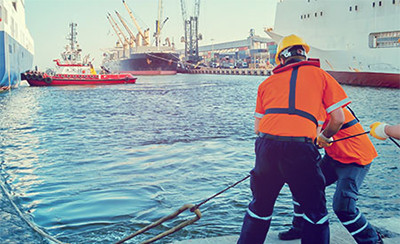Human Rights at Sea announced two new work areas covering Gender and LGBT issues as part of its drive to deliver a comprehensive and objective narrative about human rights in the maritime environment.
The new work areas include introductions to the subject matter and free downloads of Gender and LGBT Briefing Notes produced by HRAS and its advisers.
CEO Human Rights at Sea, David Hammond, said “Once again the HRAS team has delivered an independent perspective for two key areas of fundamental human rights. The coverage of Gender and non-discrimination, and LGBT in the maritime environment as part of Corporate Social Responsibility, are issues that can not be ignored. The ILO and IMO among many other national and international organisations have already undertaken extensive work on the Gender topic and today HRAS adds its voice and weight behind these issues.”
Gender Equality & Non-Discrimination
The importance of a gender perspective is increasing in recognition, profile and application across the maritime environment.
A focus on Gender Equality and Non-Discrimination as a workplace issue is globally well established including within the maritime sector through the work of the likes of the International Labour Organisation (ILO) and many other organisations.
The principles of gender equality and non-discrimination are enshrined in the ILO Constitution and delivered through ILO Conventions, Resolutions adopted by the International Labour Conference, as well as ILO global programmes. These include the likes of the Decent Work Agenda, Country Programmes and the Gender and Non-Discrimination Programme.
The subject of gender equality is further driven by international initiatives such as the International Geneva Gender Champions launched at the Palais des Nations in Geneva, 1 July 2015 and the International Maritime Organisation (IMO) Programme for the Integration of Women in the Maritime Sector (IWMS) by way of example.
The importance of understanding the fundamental principles of equality and non-discrimination which leads to understanding gender, gender perspective, gender analysis and aims, and which ultimately integrates gender as an operation strategy is as equally important within civil society as it is in the maritime context, including its application throughout the maritime industries, the maritime supply chain, Non-Governmental Organisations (NGOs) and State operations at sea.
Gender should been seen as a core part of maritime Corporate Social Responsibility (CSR) and it should also reflect a balanced approach to the application of Human Rights protections and remedies at sea.
What is Gender?
Gender is about the learned social attributes, differences and relationships associated with and applied to being either male or female in society.
- Gender is not about biological differences between men and women. These are fixed and pre-determined. These differences do not change.
- Gender is dynamic. It is subject to change; it is socially learned, constructed and applied within societies and environments.
- Gender is influenced by many factors including, but not limited to, economy, age, ethnicity, religion and levels of education for men and women.
- Gender should not represent men and women as two homogenous groups. Not all women are the same. Not all men are the same and stereotypical ideas of femininity and masculinity are often entrenched thereby shaping expectations often incorrectly.
- Gender varies between and within societies and environments. In most societies there are differences and inequalities between men and women. These inequalities relate to expectations, decision-making opportunities, assigned responsibilities, activities undertaken, access to and control over resources and employment opportunities.
- Gender can determine what is expected, allowed and valued in a man or a woman in a given context and environment.
- Gender is about the relationships between women, men, girls and boys and how this impacts on individuals and communities in all societies and environments, both social and within the business community. Gender is not a code word for ‘women’ or ‘discrimination’. A common misconception is that Gender is only relevant for women. This is incorrect. Gender is about women’s and men’s socially described roles and how that affects their power, opportunities and resources.
- Gender inequalities apply to men as equally as they do to women. This includes within the maritime environment, howsoever men or women are employed, or otherwise engaged within the maritime supply chain.
- Gender equality as a principle should apply throughout the maritime environment, and it should be upheld as a management responsibility and integrated into all institutional structures and work strands.
Read more by clicking at the following paper issued by the HRAS
LGBT at Sea
In at least 76 countries globally, same-sex relations (let alone relationship recognition) between consenting adults remains illegal; penalties range from corporal punishment, to jail terms, life imprisonment and the death penalty. Discriminatory laws are found in both explicit terms, and in vague language related to morality, the policing of gender, and offences against the ‘order of nature’.
Today, Human Rights at Sea is tackling the LGBT issue as part of its Maritime Human Rights Campaign ‘Unlocking the issue, leading the discussion’.
What Is LGBT? LGBT stands for lesbian, gay, bisexual and transgender and along with heterosexual. It describes people’s sexual orientation or gender identity. Understanding Sexual Orientation and Gender Identity is essential to be both fully aware and educated of issues that LGBT people might face in the maritime community.
On 30 September 2015, in an unprecedented joint initiative, 12 United Nations entities called on States to act urgently to end violence and discrimination against lesbian, gay, bisexual, transgender and intersex (LGBTQI) adults, adolescents, and children.
“This is the first time that so many members of the UN family have joined forces in defense of the basic rights of lesbian, gay, bisexual, transgender and intersex people”. stated Charles Radcliffe, the Chief of Global Issues for the Office of the High Commissioner for Human Rights (OHCHR).
Read more by clicking at the following paper issued by the HRAS






























































